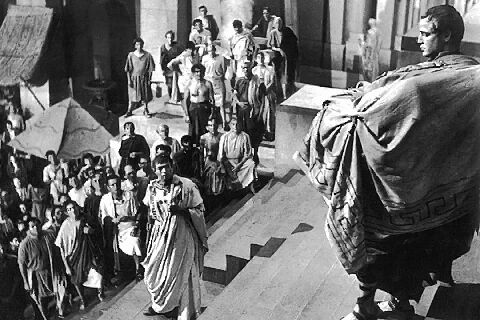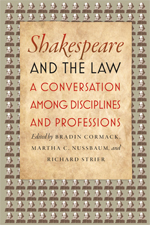Martha Nussbaum on Julius Caesar and political love
An excerpt from “‘Romans, Countrymen, and Lovers’: Political Love and the Rule of Law in Julius Caesar,” in Shakespeare and the Law: A Conversation among Disciplines and Professions
Julius Caesar shows us two different kinds of political love, in tragic opposition. Brutus is principled, but he is not cold. He loves the institutions of the Roman Republic, and he tells us that this abstract love has driven out his personal love of Caesar, as fire drives out fire. He appeals to the emotions he believes all Romans have for their threatened republican form of government. Addressing them as “countrymen and lovers” (3.2.13), he summons them to love of country and hatred of oppression. Suspicious of any particularistic attachment, Brutus prefers emotions resolutely fixed on an abstract object, which reason can justify and commend. He expects all Romans to be like him: deliberative citizens, who value liberty with both their judgment and their hearts.
Brutus’s antitype is Antony, who can understand no kind of love other than the personal, who cannot refrain from calling the dead man “Julius” even in the presence of the conspirators, and whose “Oh, pardon me, thou bleeding piece of earth” spills out over this world of philosophically moralized emotion like a red stain (3.1.206, 256). Antony knows how to manipulate the people’s desire for a beneficent father, and he plays on that love of the individual, that desire to be cared for as a parent cares for a child, in a way that rapidly subverts the people’s love of institutions and laws. The play’s verdict would appear to be that love of laws was never strong enough in the people to sustain a stable republic. The people’s hearts are touched by the particular, and the government they get is what their hearts crave.
The play thus poses one of the darkest questions of political life: can Brutus’s type of love ever motivate masses of people or determine the course of events? And if it cannot, what lies in store for freedom and the rule of law? Must the rule of law, if it is to endure at all, be undergirded by emotions more particular, more quasi-erotic, than those that Brutus favors? And if a successful love of country must be particularistic, must it take the form that Antony favors—the dependent child’s gratitude for its parent’s strength? If indeed infantile love of the father is the only love strong enough to secure political stability, then republicanism must be sustained by a type of love more suited to monarchy, if not tyranny. Perhaps, however, Brutus and Antony do not exhaust the terrain of political emotion. Perhaps there is a type of patriotic love more particularistic than Brutus’s abstract emotion that still supports the institutions that Brutus favors.
The question posed by the play tracks a debate that began in antiquity, in the reflections of Roman republicans about the foundations of republican self-government. It continues today, as some defenders of liberal republican values (John Rawls, Jürgen Habermas) insist that patriotism ought to take the abstract form favored by Brutus and as defenders of a more romantic type of nationalism insist on the need for a more particularistic type of love, focused on symbols of ethnic belonging. There is also what one might call a “third way”: some thinkers (I am one of them) believe that good laws and institutions need to be supported by emotions that are particularistic and not simply abstract, but they believe it is possible to create and sustain a particular love that reinforces and deepens the love of principles and institutions based on equal respect for the dignity of all human beings. My plan is to investigate this debate, using Shakespeare’s play and its historical sources as my guide.
***
Read more about Shakespeare and the Law: A Conversation among Disciplines and Professions, edited by Bradin Cormack, Martha C. Nussbaum, and Richard Strier here.

